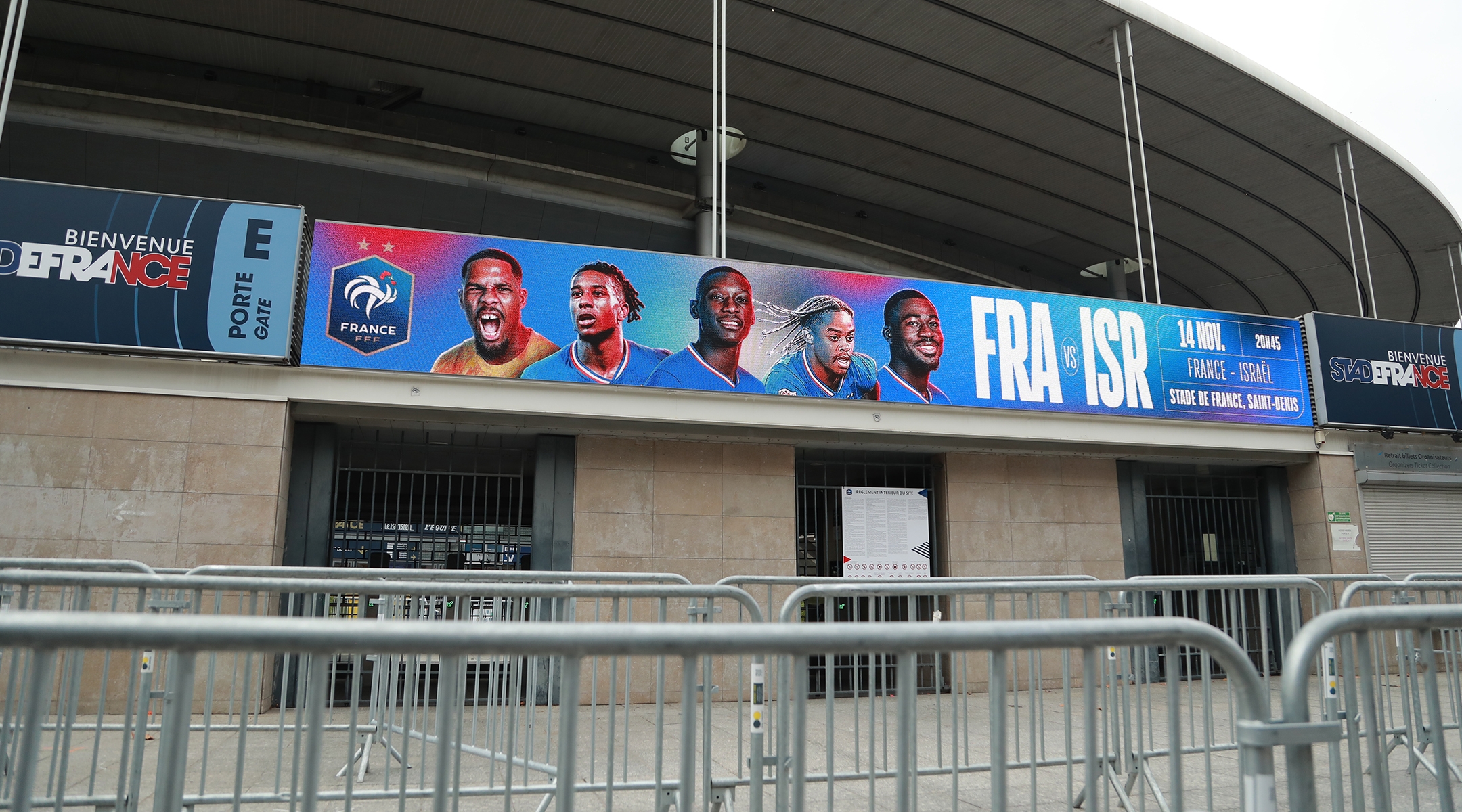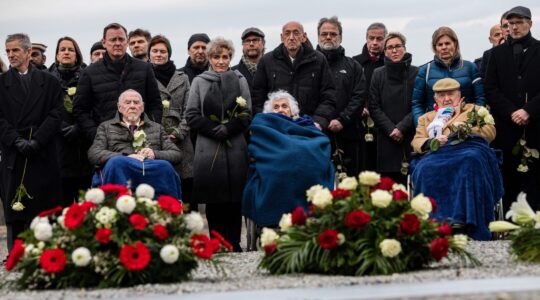Following violence against Israeli soccer fans in Amsterdam last week, France has thrown heavy policing muscle behind a soccer match with Israel on Thursday.
The UEFA Nations League game between France and Israel at the Stade de France stadium in Paris is being guarded by 4,000 officers and 1,600 stadium staff, according to Paris police chief Laurent Nunez, who deemed the event “high-risk.” Meanwhile, demand for tickets is sparse — only about 20,000 have been sold for the 80,000-capacity stadium, meaning there may be one officer for every five attendees.
Those attendees include some 150 supporters of the Israeli team, who will reportedly be escorted by police. French President Emmanuel Macron said he will also attend the match to “send a message of fraternity and solidarity after the intolerable antisemitic acts that followed the match in Amsterdam.” Israel has specifically warned its citizens to avoid the Paris game.
On Wednesday night, pro-Palestinian demonstrators staged a mass rally outside a pro-Israel fundraiser to which a far-right Israeli minister was invited.
The match is seen as high stakes for French Jews and government officials alike. “It’s the anti-Amsterdam that we have to show tonight at the Stade de France,” Yonathan Arfi, president of the Representative Council of French Jewish Institutions, said on French TV on Thursday.
The match takes place almost exactly nine years after Stade de France was struck by an Islamic State terror attack on Nov. 13, 2015, when 130 people were killed in locations across Paris.
It also comes a week after chaos ripped through the streets of Amsterdam following a match between the Israeli club Maccabi Tel Aviv and the Dutch team Ajax. As hundreds of Maccabi fans left the game at night, they were targeted in hit-and-run assaults by locals, including some who reportedly organized online to call for a “Jodenjacht” or “Jew hunt.”
Five people were hospitalized and dozens more sustained minor injuries, and more than 60 people, including 10 Israelis, have been arrested, all men between the ages of 18 and 37. The violence followed days of rising tensions in the city, home to a large Muslim immigrant population, including clashes between Ajax and Maccabi supporters and provocations by Maccabi supporters, according to Amsterdam police and videos circulating on social media.
Amsterdam officials said the violence against Israeli fans was “beyond all bounds,” adding, “There is no excuse for the antisemitic behavior displayed by rioters who actively sought out Israeli supporters to attack and abuse them.” Dutch, Israeli, European and U.S. leaders have condemned the attacks as antisemitic.
Amsterdam has been wracked by a series of aftershocks, as well as a reckoning about what changes are needed to prevent future violence. The mayor banned all protests and police have arrested hundreds of people who have defied the ban to gather for pro-Palestinian demonstrations. On Monday, police responded to a group of people throwing stones and fireworks that set a tram on fire. A nearby police bus was also set on fire and a passing cyclist was pulled from his bike and beaten, according to police. Rioters were caught on video shouting the antisemitic slur “Kanker Joden,” or “cancer Jews.”
As the aftershocks of Amsterdam’s clashes reverberated through the continent, some voices called for the France-Israel match to be canceled or relocated. Julien Odoul, a member of the far-right National Rally party, suggested moving the game to Corsica, where he said “there is no antisemitism.”
Both antisemitism and Islamophobia have been central to France’s recent political ferment in which both the far left and far right have recently gained prominence.
As in the Netherlands, France has grappled with surging antisemitism in recent years. The country’s Jewish and Muslim communities, both the largest in Europe, have also felt the impact of Hamas’s Oct. 7, 2023, attack and Israel’s subsequent wars in Gaza and Lebanon. France’s human rights commission said in June that antisemitic incidents rose 284% and anti-Muslim acts rose about 33% in 2023.
French Interior Minister Bruno Retailleau told parliamentarians on Tuesday that although Jews make up less than 1% of the French population, they are the targets of 57% of all racist and anti-religious attacks in the country.
Retailleau said canceling or moving the match would mean “giving in to sowers of hate.” Many Jews agreed, including Tom Cohen, who founded the Liberal synagogue Kehilat Gesher in Paris in 1993.
“I think that if they had [canceled it] then the terrorists would have won, because that’s exactly what they want,” Cohen said in an interview. “They want to take away Jews and Israelis from public life.”
The Paris game was a contested issue even before the Amsterdam attacks. About 40 pro-Palestinian activists staged a sit-in at the French Football Federation headquarters on Nov. 4, demanding the game’s cancellation because of Israel’s war in Gaza. Those calls have been echoed by France Unbowed, the largest left-wing party in the French National Assembly.
Some France Unbowed members have also dismissed the government stance that the Amsterdam attacks were antisemitic. Lawmaker Marie Mesmeur said on X that the Maccabi supporters “were not lynched because they were Jewish, but because they were racist and supported genocide.”
Émile Ackermann, who co-founded the first Modern Orthodox Jewish community in France with his wife Myriam Ackermann-Sommer, said that many French Jews felt their worries about antisemitic violence went unheard by such lawmakers.
“We don’t have to ignore the fact that it is political to have a soccer match with Israel,” Ackermann said. “But I think we have to be able to separate the two. The people who want to cheer the Israeli national team are not the ones responsible for sometimes bad decisions about Gaza and Lebanon. I think it’s very sad that people here on the left don’t want to make a distinction.”
Meanwhile, French Jews are keeping an eye on copycat attacks following Amsterdam’s unrest. In neighboring Belgium, Antwerp police identified six young people who were circulating messages online that called for actions similar to the violence in Amsterdam. Two people have been arrested, as the term “Jew hunt” becomes more prominent on social media apps such as Telegram and Snapchat.
And in Berlin, members of the Jewish youth soccer team Maccabi Berlin were chased by a group carrying sticks and knives on Nov. 7, the same night as the Amsterdam attacks. Shlomo Afanasev, a player’s father, said on X that his 13-year-old son and other children were “insulted and even spat on several times” by youths who appeared to be Arab and shouted “f—ing Jews” and “free Palestine.” Maccabi Berlin has been placed under police protection and the Berlin Football Association has initiated court proceedings.
It was the second incident in one week to target the German-Jewish football club in Berlin — on Nov. 3, a 50-year-old fan wearing a Maccabi scarf was insulted and beaten by a man in a cafe, according to police.
JTA has documented Jewish history in real-time for over a century. Keep our journalism strong by joining us in supporting independent, award-winning reporting.






